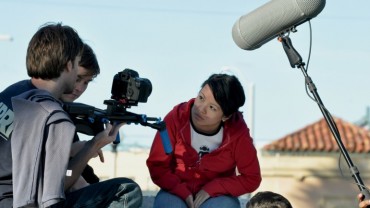VIETTE-NAM: (H)annoyed No More, and the Sigh Gone
 Mye Hoang is baaaaack at the SDAFF, but this time it’s personal…no joking, it is.
Mye Hoang is baaaaack at the SDAFF, but this time it’s personal…no joking, it is.
For many years, Hoang worked for the San Diego Asian Film Foundation applying her personal touch, knowledge and experience with Asian film to help what is today the Pacific Arts Movement’s flagship event, the San Diego Asian Film Festival, now considered the second biggest Asian Film Festival in the United States.
Hoang left the Foundation to pursue other opportunities, one of which was to produce, act and direct in a very intimate and personal story. It is a tale filled with betrayal, domestic violence, physical/emotional/verbal abuse, sex, deception and an unrequited love that eventually led her down an ominous road that perhaps has guided her to personal salvation…at least on the surface.
The movie is Viette, and it is her life story, a harrowing saga that even her co-workers at the SDAFF were unfamiliar with, including the Pacific Arts Movement founder and executive director Lee Ann Kim.
It was Monday night, November 5, 2012 and last night, Wednesday, November 7 or Day 7 of the 13th Annual SDAFF that Hoang arrived on the other side of the cinematic coin…a filmmaker and interviewee.
After the premiere screening, Hoang, and three members of the cast, Sean McBride, Joshua Bednarsky and Chi Pham, had a Q&A session.
Kim admits to Hoang and the audience that it is really awkward for her (Kim), sharing that for those of us that know Mye, she is a very private person and none of us knew she had this in her. When Kim asks Hoang what is her motivation for making such a private thing so public Hoang admits, “I am a very shy and private person. Because I’ve lived this secret life for so long , I feel now that I can talk about.
“There are many things people have with bad experiences and don’t talk about it. This is a way to articulate my feelings. Even my friends close to me during those years didn’t really know what was happening. I had a High School mentor, a writer who said write what you know, and if you have a story, you have a responsibility to tell that story.”
During the early script stages of the project Hoang never even thought the film would ever get made, never mind being the lead.
 “But then it made sense to cast myself,” she quips. “I didn’t want to compromise myself on things like nudity and violence. Plus many Asian American women may not do this kind of role because they’d be disowned by their family. (slight giggle) And so since I’m already disowned, I had nothing to lose. I walked into this project fearlessly and didn’t care about what people thought and I didn’t want to cast anyone who might chicken out at the last minute and compromise what I want.”
“But then it made sense to cast myself,” she quips. “I didn’t want to compromise myself on things like nudity and violence. Plus many Asian American women may not do this kind of role because they’d be disowned by their family. (slight giggle) And so since I’m already disowned, I had nothing to lose. I walked into this project fearlessly and didn’t care about what people thought and I didn’t want to cast anyone who might chicken out at the last minute and compromise what I want.”
Hoang hopes that audiences will walk away from Viette and see the film as an argument for compassion, tolerance, and acceptance. Maybe a parent can improve their relationship with their children adding, “Be more accepting of them and develop a healthly relationship with them.”
She gleefully shares, “A man at a screening said the film inspired him to treat his girlfriend more respectfully. That touched me that my film could cause that reaction.”
Kim saliently closes with question on many people’s minds, “Have your parents seen it?”
Pause of silence later Hoang blurts, “I don’t think my parents know it exists, I hope it remains that way.”
The irony about Hoang’s story is that she had an abusive father and at the end of day, she married a man similar to her father.
For individuals in similar situations, if repressed emotions are not fully processed internally, at the gut level, history will repeat itself.






Join the Conversation